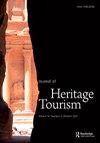A review and SWOC analysis of natural heritage tourism in sub-Saharan Africa
IF 2.2
Q2 HOSPITALITY, LEISURE, SPORT & TOURISM
引用次数: 1
Abstract
The paper analyses the state of natural heritage tourism in sub-Saharan Africa (SSA) and assesses its strengths, weaknesses, opportunities, and challenges (SWOC), accordingly. Data were obtained from secondary information sources and analysed using the inductive qualitative approach. The paper illustrates the existence of a mutual relationship between natural heritage and tourism in the SSA region. Identified strengths include a diverse and extensive protected area (PA) network, foreign direct investment inflow, and community-based natural resource management projects. The main opportunity lies in the great untapped potential for natural heritage tourism in the region. Findings reveal that most of the weaknesses of SSA countries are related to budget constraints. The main challenges to the sustainability of natural heritage include political instability, climate change, wildlife crime, and land use changes. The paper concludes that while the region has several strengths and opportunities, there also exist several weaknesses and challenges, which negatively impact the sustainability of both the natural heritage legacy and tourism. To enhance the sustainability of both, there is need for a sustained management of tourism impacts at the natural heritage sites, and persistent engagement of necessary stakeholders to devise innovative ways of enhancing sustainable revenue streams for nature and wildlife conservation.撒哈拉以南非洲地区自然遗产旅游综述与SWOC分析
本文分析了撒哈拉以南非洲地区自然遗产旅游的现状,并对其优势、劣势、机遇和挑战进行了评价。从二手信息源获得数据,并使用归纳定性方法进行分析。本文阐述了南南区自然遗产与旅游之间的相互关系。确定的优势包括多样化和广泛的保护区网络、外国直接投资流入和以社区为基础的自然资源管理项目。主要的机会在于该地区尚未开发的自然遗产旅游潜力。调查结果显示,SSA国家的大多数弱点都与预算限制有关。自然遗产可持续性面临的主要挑战包括政治不稳定、气候变化、野生动物犯罪和土地利用变化。本文的结论是,虽然该地区有一些优势和机遇,但也存在一些弱点和挑战,这些弱点和挑战对自然遗产和旅游业的可持续性产生了负面影响。为了提高两者的可持续性,需要对自然遗产地的旅游影响进行持续管理,并需要必要的利益攸关方持续参与,设计创新方法,增加自然和野生动物保护的可持续收入来源。
本文章由计算机程序翻译,如有差异,请以英文原文为准。
求助全文
约1分钟内获得全文
求助全文
来源期刊

Journal of Heritage Tourism
HOSPITALITY, LEISURE, SPORT & TOURISM-
CiteScore
6.50
自引率
11.10%
发文量
39
期刊介绍:
The Journal of Heritage Tourism ( JHT ) is a peer-reviewed, international transdisciplinary journal. JHT focuses on exploring the many facets of one of the most notable and widespread types of tourism. Heritage tourism is among the very oldest forms of travel. Activities such as visits to sites of historical importance, including built environments and urban areas, rural and agricultural landscapes, natural regions, locations where historic events occurred and places where interesting and significant living cultures dominate are all forms of heritage tourism. As such, this form of tourism dominates the industry in many parts of the world and involves millions of people. During the past 20 years, the study of tourism has become highly fragmented and specialised into various theme areas, or concentrations. Within this context, heritage tourism is one of the most commonly investigated forms of tourism, and hundreds of scholars and industry workers are involved in researching its dynamics and concepts. This academic attention has resulted in the publication of hundreds of refereed articles in various scholarly media, yet, until now there has been no journal devoted specifically to heritage tourism; Journal of Heritage Tourism was launched to fill this gap. JHT seeks to critically examine all aspects of heritage tourism. Some of the topics to be explored within the context of heritage tourism will include colonial heritage, commodification, interpretation, urban renewal, religious tourism, genealogy, patriotism, nostalgia, folklore, power, funding, contested heritage, historic sites, identity, industrial heritage, marketing, conservation, ethnicity, education and indigenous heritage.
 求助内容:
求助内容: 应助结果提醒方式:
应助结果提醒方式:


